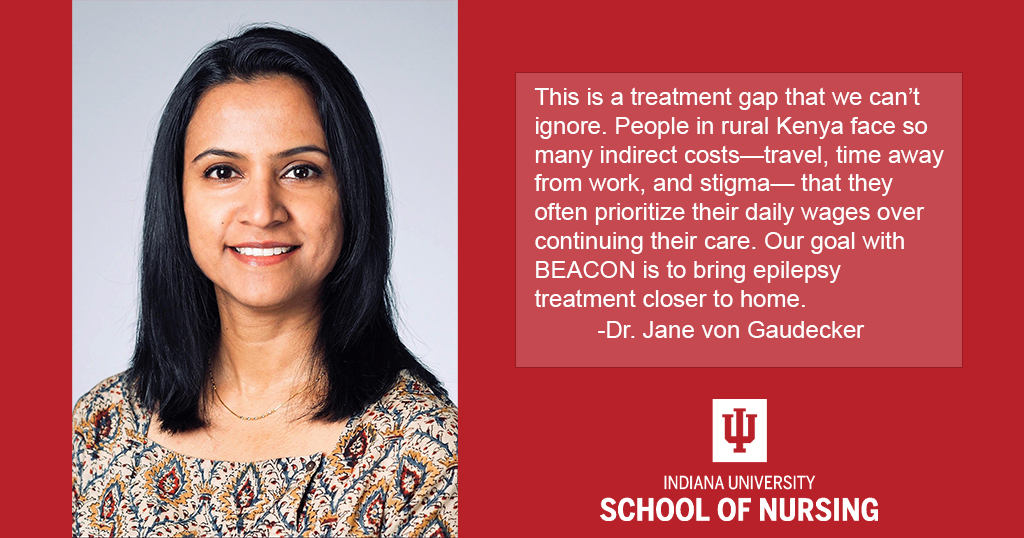Epilepsy remains a significant global health burden, affecting 1% of the world’s population, with the highest rates in sub-Saharan Africa. In Kenya, over 80% of people with epilepsy live in low-resource settings, where access to care is often limited. To address this challenge, Dr. Jane von Gaudecker, Ph.D., RN, associate professor at the Indiana University School of Nursing, is leading a groundbreaking study, “Bridging the Treatment Gap by Expanding Access to Care for People with Epilepsy in Kenya” (BEACON). Supported by a $2.4 million grant from the National Institute of Neurological Disorders and Stroke and the Fogarty International Center, the study seeks to improve epilepsy care in western Kenya, with Dr. Chrispine Owuor Oduor, MBChB, MMed, from Moi Teaching and Referral Hospital in Kenya, serving as co-principal investigator.
Kenya’s healthcare system is divided into various levels, with most people relying on public facilities due to the prohibitive cost of private healthcare. However, von Gaudecker's previous study revealed that only 28% of newly diagnosed epilepsy patients at tertiary hospitals returned for follow-up, underscoring a large treatment gap. Contributing factors include the high cost of care, long travel distances, stigma, and a lack of awareness about the importance of medication adherence.
“This is a treatment gap that we can’t ignore,” said von Gaudecker. “People in rural Kenya face so many indirect costs—travel, time away from work, and stigma—that they often prioritize their daily wages over continuing their care. Our goal with BEACON is to bring epilepsy treatment closer to home.”
The BEACON project is designed to tackle these challenges through a combination of task-sharing and technology. Healthcare professionals—nurses, clinical officers, and medical officers— at the lower levels of the public healthcare system will receive specialized training to diagnose and manage epilepsy, allowing them to handle cases effectively. Also, community health workers will be trained to screen individuals living with epilepsy in the community and support patient follow-up. This task-sharing model will bring care closer to patients in rural and semi-urban areas, reducing the need for long-distance travel to tertiary hospitals. In addition, the study is integrating an Epilepsy Medical Record System (EMRS) to support patient tracking and follow up, ensuring continuity of care.
Epilepsy is responsible for a significant disease burden, with delays in treatment and medication non-adherence leading to poor quality of life, high healthcare costs, and a risk of injury or premature death. Cost-effective, culturally appropriate interventions are crucial in closing the treatment gap and improving care retention and antiseizure medication (ASM) adherence.
The BEACON study is innovative in its use of a cluster-randomized trial to compare usual care with a task-sharing intervention supported by the EMRS. Through its three specific aims, the study will build clinical and research capacity in Kenya, evaluate the intervention’s effectiveness, and assess its cost-effectiveness. Ultimately, the project seeks to reduce the epilepsy treatment gap and improve care outcomes by leveraging Kenya’s existing healthcare infrastructure.
“Epilepsy is a condition steeped in myths and misconceptions,” von Gaudecker explained. “Some people believe it’s contagious, or caused by witchcraft, which makes it difficult for patients to seek treatment. Through this initial intervention study aimed at addressing the epilepsy treatment gap in western Kenya, we will begin by training healthcare professionals. Our aim is to shift these attitudes and enhance the quality of care for people with epilepsy.”
Despite the many challenges, the BEACON team is working closely with the community stakeholders in the region where the study will take place. Community leaders, traditional healers, healthcare professionals, patients, and their families have expressed a strong desire for better epilepsy care, suggesting that the intervention will be well-received. While there is currently no budget for a full-scale community engagement intervention, von Gaudecker is optimistic that the ripple effect of training healthcare professionals will extend to the broader community.
“Our hope is that what we learn here will inform epilepsy care globally, especially in resource-limited communities and areas that still carry these myths and misconceptions,” she said. "This project is about giving people the care they deserve, no matter where they live."
The long-term goal of BEACON is to create a scalable, sustainable model for epilepsy care in low-resource settings, not only in Kenya but also in other countries facing similar challenges. Through collaboration with AMPATH (Academic Model Providing Access to Healthcare), von Gaudecker and her team aim to transform epilepsy care in Kenya and provide a model for improving care outcomes worldwide.


